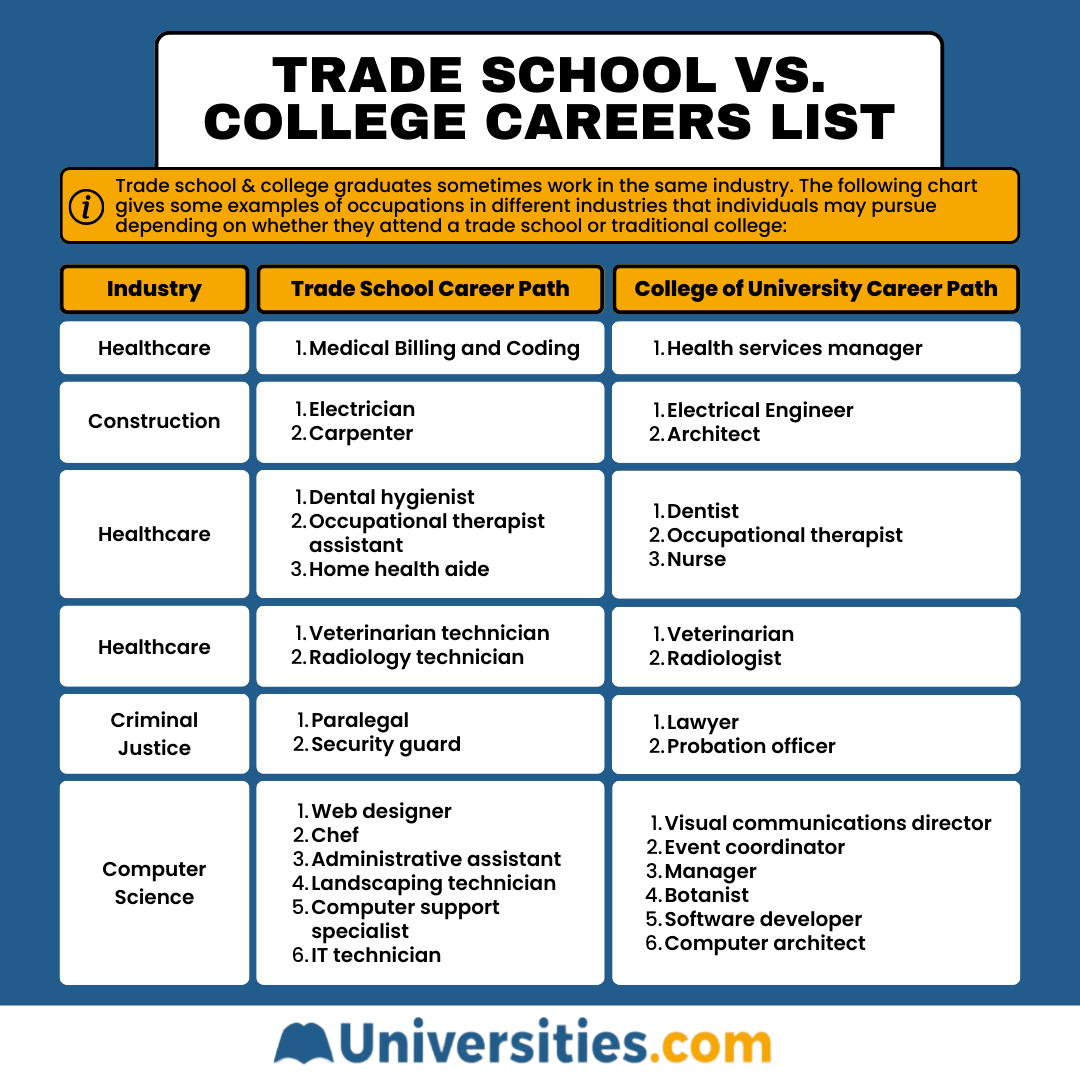
Trade School Vs. College
What do plumbers, dental hygienists, mechanics, and web designers have in common? They are all occupations people can train for by attending a trade school.
Continuing one’s education after high school is a smart move in today’s increasingly complex and specialized world. Post-secondary studies open up doors to interesting, higher-paying jobs. College certainly is one route to consider. But for many people, trade schools prove a great match.
Key differences exist between the two. While it takes four years to earn a bachelor’s degree at a tradition college, trade school certificates or diplomas require two years or less to complete. Studies in college cover a range of subject matters and set up students for entry into a variety of possible careers or admission into graduate school. Trade school coursework focuses specifically on the knowledge and skills necessary to enter a chosen profession.
As all educational options involve commitment of time and money and impact future options, it pays to examine choices thoroughly. With that in mind, let’s take a closer look at the similarities and differences between a trade school vs. college.
What Is A Trade School?
A trade school is an institution of higher learning that people attend to acquire the background and abilities needed for employment in a certain job. Trade schools focus on quickly preparing students to enter the workforce in their chosen profession. Courses relate directly to the occupation and often include hands-on practice of skills and gaining mastery of the job’s tools. Trade schools can be public or private, non-profit or for-profit.
What Are The Similarities And Differences Between A Trade School Vs. A College?
While both trade schools and colleges are great places to advance your career, they are not exactly the same. One is not better or worse than the other. Picking the educationally best route is a highly personal decision based on individual interests, needs, and circumstances.
Similarities between trade schools and colleges
Differences between trade school and college include:
What Types Of Skills Do Trade School Students Have?
The abilities one acquires in trade school depends on the program pursued. A plumber, for instance, will learn much different skills than someone training to become a home health aide.
A hallmark of trade school studies in general is practical application. Students learn by doing. For example, an aspiring mechanic changes oil, diagnoses why an engine rattles, and repairs brakes. The classes that mechanic student takes will be focused and support these specific skills. Math isn’t presented as a vast concept. Rather, it is taught as it specifically applies to measurements or calculations needed to perform a specific job.
Students who like to work with their hands often find trade school invigorating. They enjoy “getting to the action,” whether that be a chef learning how to properly use cutlery or an electrician rewiring a lamp.
Many also like that the material presented “gets to the point.” You understand how what is being taught applies directly to the craft you wish to master.
What Can You Do With a Trade School Degree

Trade school programs exist in a variety of fields. Depending on the discipline you choose, your certificate or degree could lead to employment in areas such as:
- HVAC (heating, ventilation, and air conditioning) technology
- Plumbing
- Home inspecting
- Engineering technology
- Landscaping technology
- Healthcare
- Welding
- Electrical
- Construction
- Mechanical repair
- Pipefitting
- Carpentry
- Media and digital arts
- Culinary arts
- Commercial arts
- Legal and criminal justice
- Business administration
- Emergency management
- Computer technology
Trade School Careers List
Trade school and college graduates sometimes work in the same industry. They differ, however, in the positions for which they qualify. The scope of their duties varies, as sometimes does their eligibility to take on managerial or leadership roles.
The following chart gives some examples of occupations in different industries that individuals may pursue depending on whether they attend a trade school or traditional college:
|
Industry |
Trade School Career Path |
College or University Career Path |
|
Healthcare |
Medical Billing and Coding |
Health services manager |
|
Construction |
|
|
|
Healthcare |
|
|
|
Healthcare |
|
|
|
|
|
|
|
How Much Does a Trade School Cost vs. Traditional College?
Trade schools and colleges vary greatly in cost. Factors that may influence how much you pay at either include:
- The institution’s tuition and fees
- Residency (public institutions often charge less to state/area residents)
- The number of courses taken at a time (full-time vs. part-time study)
- Materials and books needed for your specific program
- Housing, meal, commuting, and parking costs
Generally, trade schools tend to cost less than colleges. Why? For starters, program length is shorter. Also, many trade schools do not offer housing. Students often live at home, which cuts out pricey on-campus room and board.
The National Center for Education Statistics (NCES) states the following as average tuition and fees per year for four-year colleges:
- Public college: $9,400
- Private, for-profit college: $18,200
- Private, non-profit college: $37,600
The cost of trade school is a little more difficult to pinpoint. Programs take different amounts of time to complete. Plus, some trades require tools that add to the financial burden. U.S. News and World Report estimates the average cost of completing an entire trade program is $33,000. And since people who finish trade school enter the workforce quicker than their college counterparts, they can begin cashing in on their education faster.
Paying for Trade School
Just like college students, those attending trade school need to figure out how to pay for their education. This process often starts with talking to financial aid representatives at the school of interest. These professionals can provide an overall look at what the studies you wish to pursue will cost and how you might cover those expenses. They may suggest filling out the Free Application for Federal Student Aid (FAFSA). Trade schools that participate in the federal student aid program use this information to determine eligibility for grants, loans, and work-study opportunities.
And don’t forget about scholarships! They are a highly desirable way to help finance an education because they do not need to be paid back. Apply for any scholarships of which you meet the qualifications. A great one to start with is Universities.com’s trade school scholarship. This recipient will receive $500!
Do Trades Make More Money With The Labor Shortage?
With the U.S. continuing to experience a low unemployment rate, many employers find it difficult to fill job vacancies. This shortage definitely extends to many trades, sometimes even to a greater extent than positions requiring a college degree. As one luxury car manufacturer laments, the company has plenty of engineers working to build its cars, but they lack mechanics to actually work on them.
Because the demand for qualified workers often exceeds the supply, trade school graduates at the moment may command larger salaries than in previous years. For instance, while the Bureau of Labor Statistics states the median yearly salary for an electrician as $60,040, some states are reporting new graduates of trade school electrician programs earning $80,000.
Remember, though, that many factors influence how much someone earns. Geography, skillset, experience, and choice of trade all impact salary. Likewise, the economy fluctuates over time, so no guarantee exists about earning potential. What many trades do have in their favor on a consistent basis is need. When the heat or air goes out, people need to contact an HVAC specialist. When a broken pipe floods a house, a plumber gets a call.
So Which Is Better…A Trade Certificate Or A College Degree?
Trade schools and colleges both provide plenty of great options for people looking to enhance their knowledge and employability. One is not “better” than the other. The right choice of which route to select is the one that fits best with your individual situation and aspirations.
While examining your own needs and interests is key, here are some considerations to aid in making an informed decision:
College might be the way to go if:
- You are undecided about what career you might want to pursue
- You want to learn about many subjects or acquire skills applicable to a variety of careers
- You think graduate or professional school might be a future goal
- You crave an active campus social scene
Trade school might be a great choice if:
- You are ready to commit to a specific career
- You want classes to focus just on material pertinent to your occupation
- You enjoy working with your hands and developing mastery of tools used in a given trade
- You want to finish a program quickly in order to get into the workforce

Trade School vs. College FAQ
